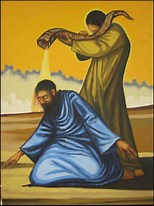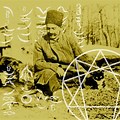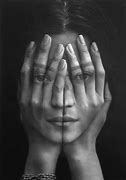The Sacred Waters




The Sacred Waters
And Aaron and his sons thou shalt bring unto the door of the tabernacle of the congregation, and shalt wash them with water.
Exodus 29:4
Water was used by the early Hebrews for cleansing and purifying. Due to a commandment given by God to Moses, in the city of David, Jerusalem, pilgrims went daily in a big procession to the spring, Shilock, the waters of which were said to cleanse and sanctify.
The priests had to sanctify their hands and feet with water poured from a golden flask before they could go to the altar, or do anything of spiritual significance.
Baptism is a Christian sacrament of spiritual rebirth by which the recipient is cleansed of original sin through the symbolic application of water - by immersion, pouring or sprinkling. Muslims, five times a day, obey these words of the Koran:
When you prepare for prayer, wash your faces, and your hands (and arms) to the elbows; rub your heads ( with water); and (wash your feet to the ankles). if you are in a state of ceremonial impurity, bathe your whole body.' (Sura 5:7) If water is not available, 'clean sand or earth' is to be used instead.
The spiritual nature of water is also recognized in India, where the fondest wish of devout Hindus is to bathe in the River Ganges at least once in their lifetime and have their ashes scattered on it after death.
The river is referred to as Ganga Ma, Mother Ganga, and each day countless worshippers can be seen on her shore, chanting prayers and offering flowers.
Those who bathe devoutly once in the pure currents of the Ganga, their tribes are protected by her from hundreds of thousands of dangers. Evils accumulated through generations destroyed. Just by bathing in the Ganga one gets immediately purified.The Brahmandapurana.
The tradition of ritual bathing may go back over 4,000 years on the Indian subcontinent, to the city of Mohenjo Daro in present-day Pakistan, The city was built on a grid system, with each house having a bathroom and toilet - with a clay-pipe drainage system - and a 'Great Bath' measuring 39 by 23 feet, and 8 feet deep, which was probably used for ritual purification purposes.
Bathing has two meanings from a spiritual point of view. It can denote cleansing before taking part in religious observance, or spiritual transformation as in baptism. Immersion in water induces a state of relaxation which quite often leads to moments of inspiration, spiritual and otherwise.
When creating your own sacred waters, run the warm bath water, then add the essential oil - with the bathroom door closed to ensure the aroma molecules remain in the room. The essential oils are inhaled with the steam, and absorbed through the skin by osmosis. As a general rule, use 4-6 drops of essential oil per bath. This may not seem a great deal, but just one drop of essential oil will infuse the entire body of water with its aromatic impact. Lie there for at least ten minutes, inhaling the precious fragrance.
Bath rooms sometimes have electrical fans installed in them, often integral to the light fitment. When using essential oils for spiritual purposes, the noise and vibration of these fittings may disturb the energy or atmosphere you wish to create, so candlelight would be more appropriate.
Some people like total silence as they lie in the water - the amniotic fluid of the universe - while others may prefer the sound of gentle music to help them reach the higher realms. Bathing always allows a certain detachment from the hubub of daily life, but, with a little extra thought and preparation, and the fragrance of the heavens, the inner core of spirituality can more easily be experienced.
Reference: The Fragrant Heavens: V.A. Worwood
Anointing
 v
v







Anointing
Then the Lord said to Moses.
"Take the following fine spices: 500 shekels of liquid myrrh, half as much (that is 250 shekels) of fragrant cinnamon, 250 shekels of fragrant cane, 500 shekels of cassia - all according to the sanctuary shekel - and a hint of olive oil. Make these into a scared anointing oil, a fragrant blend, the work of a perfumer. it will be the sacred anointing oil.'
The Holy Bible New International Version Exodus 30:20-25
By anointing with the oil, the sick are strengthened and healed, the catechumens are empowered to resist Satan and to reject sin and evil, the batized are sealed with the
gifts of Spirit, and the ministers of the Church are sanctified in God's service.
Through the use of these holy oils may God's grace be poured forth always upon the Church.
Rite for blessing the repository in which anointing oils are kept (Catholic Church) Book of Blessings 1985
Anointing was practised by the ancient Mesopotamians, Egyptians, Syrians and Persians, as well as by the Hebrews. In Egypt, according to Eugene Rimmel, author of the book of Perfumes, 'Besides incense, ointment was also offered to the gods, and formed an indispensable part of what was considered a complete oblation. It was placed before the deity in vases of alabaster or other costly material, on which was frequently engraved the name of the god to whom it was offered.
Sometimes the king or the priest took out a certain portion, and anointed the statue of the divinity with his little finger... No king could be crowned without being anointed: this was done privately by the priests, who pretended that the ceremony had been performed by a god, in order to convey to the people a more exalted notion of the benefits conferred on their monarchs.' Even mummies were anointed, several times a year, with 'sweetly scented oil' which 'was poured over their heads and carefully wiped off with a towel carried on the shoulder for the purpose. A priest was generally called in to officiate on these occasions.'
Mary Magdalene is sometimes called 'the patroness of aromatherapy' because she famously anointed Jesus with a great deal of spikenard in St John 12:3-7 and St Mark 14:3-8. Jesus sent his disciples out 'by two and two', to spread the word, and in Mark 6:13, 'they cast out many devils, and anointed with oil many that were sick, and healed them.'
According to Martin Dudley and Geoffrey Rowell, authors of The Oil of Gladness, anointing in Christian Tradition, during the early Church years'...there was a good deal of "do-it-yourself" anointing during this period.
Phials of oil are passed from a holy man to distressed a woman, from monk-bishop to the terminally sick. 'Ideally the anointing oil should have been blessed by a bishop, a presbyter, or even a holy man of the desert, but if absolutely stuck', the oil from a lamp in the church would have to do.
Around Ad 405, Pope innocent ll told a bishop that oil consecrated by him 'is lawful not for the priests only but for all Christians to use for anointing in their own need or in the need of members of their household'.
The significance of the act of anointing in the Christian tradition is perhaps best made clear by the words used during the holy rites. The following are the words used during the rites of various traditions; where there is a '+' symbol, that indicates a cross is made with the fingers at that point. The first two extracts are form the consecration of the Holy chrism rite, and are very similar although they're from two churches - the contemporary Anglican and the Reformed Roman.
And so, Father, by the power of your love, bless to our use this mixture of oil and perfumes as a sign and means of your heavenly grace. Pour out the gifts of your Holy Spirit on those who are anointed with it. Let the splendour of your holiness shine on the world from every place and thing signed with this oil.
Contemporary Anglican rite-Consecration of the Holy chrism
And so, Father by the power of your love, make this mixture of oil and perfume a sign and source + of your blessing. Pour out the gifts of your Holy Spirit on our brothers and sisters who will be anointed with it. Let the splendour of holiness shine on the world from every place and thing signed with this oil.
Reformed Roman rite - Consecration of the Holy chrism
Oh, Lord the Creator of all things, by your servant Moses you commanded the hallowing of ointment made with the mixture of aromatic herbs: We humbly implore your mercy that you would bestow the grace of your Spirit and the fullness of + consecration on this ointment, drawn from a growing plant..
May this mingling of liquids bring to all anointed with them the mercy and safe protection for ever and ever Amen.
Pre-Vatican 11 Roman rite - Consecration of the Holy Chrism
Lord God you bring healing to the sick through your son, Jesus Christ, our Lord. may your blessings come upon all who are anointed with this oil, that they may be freed from pain and illness and be made whole. Amen.
Lutheran Church in America and Canada. Prayer for the laying on of hands, and anointing the sick, using olive oil blended with aromatic ingredients
...and we pray that we may receive your hallowing , like the chrism which is poured upon our heads, since the chrism which is poured out in the Name of your only begotten Son, Christ our God, through whom the whole world, visible and invisible, is sweetly scented.
The Byzantine Rite, Blessing of the Holy chrism
The byzantine chrism is made by combining olive oil with between thirty -eight and fifty seven- aromatic substances, making it one of the most complex synergistic blends ever devised. different Christian traditions apply holy chrism in different circumstances, which may include some, or all of the following: Baptism, confirmation, anointing the deceased, ordination of bishops, altars, chalices and bells.
In the Roman Catholic Church, the only requirement is that' some aromatic substances' is added, so there is a fair amount of variation in the constituents.
In a private communication, Revd Allen Morris has said that, 'it would be proper only for natural fragrances to be used.'
In the Christian tradition, in years gone by, the use off fragrance by women for cosmetic purposes was sometimes frowned upon because it seemed to indicate a certain frivolity, or because it diverted aromatic resources, from their more important, spiritual, use.
These days, fragrant materials are much more widely available - especially in synthetic form, but we have forgotten that fragrance is inextricably linked with spiritual practice. Yet, what does a woman do when she dabs perfume on her wrist but anoint herself? It seems a profoundly secular act, the height of indulgence, yet it finds echoes in our spiritual past, when people made themselves fragrant to make themselves more acceptable to God.
Although fragrance has got itself a bit of a bad name because of ' the fallen woman' syndrome, it was originally used to attract God and the angels, rather than any potential suitor. If we can get past any self-indulgent or even lascivious connotations, and understand the spiritual nature of fragrance, then 'anointing ' in this sense can assume again some of its original purpose and meaning.
In the traditional use of the word 'anointing', oil is always taken as the basic substance used. But if fragrance is the key substance of interest, it can be carried in a water-alcohol solution as well as by the oil. We can make our own spiritual blends of essential oils, and use them within an oil-based 'perfume' or within a water-based spray, like an eau de Cologne.
The aroma in these circumstances is intended to attract the messengers of heaven, and help us become closer to the universal whole as we carry out our spiritual practice, such as prayer, meditation or affirmations.
Thou lovest righteousness, and hatest wickedness: therefore God, thy God, hath anointed thee with the oil of gladness above thy fellows.
All thy garments smell of myrrh, and cloves and cassia, out of the ivory palaces, whereby they have made thee glad. Psalm 45:7-8
Reference: The Fragrant Heavens:V.A.Worwood
Making the Spiritual Connection





Making the Spiritual Connection
And there appeared unto him an angel of the Lord standing on the right side of the altar of incense.
St Luke 1:11
When using essential oils specifically for subtle healing or spiritual enhancement, create a special time to link with the divine energy of the universe. You may plan this, or intuitively decide 'this is the time' but whichever it is, approach it as sacred and special.
Mark it out in your mind as qualitatively different from the rest of the day. What you do in that time - in terms of it being a ceremony or ritual of some sort - is not as important as approaching it with right intention. Empty your mind of negativity, focus on the positive, and recognize the divinity in the energy that pervades all living things. Breathe deeply, slow down, and rest in infinite peace within yourself.
The Heavenly Atmosphere
.........among the ten thousand rites, the burning of incense has the primacy...........
Taoist Liturigical Text
In the Eastern spiritual traditions of Hinduism, Buddhism, Shinto and Taoism, the burning of incense is common place both during public worship at temples or shrines and at home. The earliest evidence for the burning of incense in China comes from the Shang dynasty, which was 1500-1066BC. Islam has also been very positive about the use of fragrance, partly because of these words ascribed to the prophet Mohammed: 'It has been given to me to love three things in your base world: women, perfume and prayer, but the apple of my eye is prayer.
' In Pakistan Muslims use incense during ceremonies of circumcision and marriage, and it's burnt from the moment a person dies until they are buried.'
The Western spiritual tradition of Judaism and Christianity, on the other hand, have historically been ambivalent about the religious use of fragrant materials, with different branches of the religions at different times, being for and against it. The early antipathy to the burning of incense, other than for priestly use, comes from the fact that the religious opposition - goddess worshippers - burnt incenses in some profusion.
In Ezekiel 8:9-14, for example, we hear how 'abominations' were taking place in the form of idol worship, with seventy elders, '....every man his censer in his hand; and a thick cloud of incense went up', with women weeping for Tammuz, lover of the goddess Ishtar, the 'Queen of Heaven'. These practices were already ancient at the time, having been imported from Babylon. The early Hebrews were also, of course, familiar with the burning of incense, which was an important aspect of Egyptian spiritual practice.
Incense-burning became central to Jewish ritual, but was controlled by the priests, starting with Moses and Aaron. In Exodus 30:34-37, God ordered Moses to make incense:
Greek Orthodox churches offer up incense every day, as well as at Eucharistic and sacramental worship. 'On a less formal level', explains Gregorios Archbishop of Thyateira and Great Britain, 'incense is used in the homes in a simple ritual in the morning and at sunset when a member of the household(usually the lady of the house) will offer prayers and incense in front of the family's icons and will take the incenses into each room of the house and also incense the members of the family. Even in those households where the daily offering of incense has less emphasis, the incense will be offered at sunset on Saturday and great festivals - sunset being the beginning of the new day in the Orthodox Church and therefore the beginning of the feat.
There are many types of incense used in homes around the world, such as incense sticks or cones and aromatic plant material placed on burning charcoal. People have different reasons - secular as well as sacred - for burning fragrance in their environment.
It's been used to 'fumigate' against insects and disease; simply as a perfume, for helping focus during meditation and when offering prayers. Whatever form it comes in, incense gets its aroma from the aromatic molecules of the plant materials from which it is derived - essential oils. When incense is burnt, there can be a great deal of smoke, which some people enjoy.
For those who don't essential oils provide another option.
There are many ways of using essential oils in an enclosed environment, but the most usual means is in a diffuser. How much essential oil you use will depend on the strength of the aroma required, the size of the area, and the power of the essential oil(s) being used.
Bearing these things in mind, use between 6-12 drops for an average -size room, or more if you wish.
It brings communication with the transcendent
Take unto thee sweet spices, stacte, and onycha, and galbanum; these sweet spices with pure frankincense: of each shall there be a like weight: And thou shalt make it a perfume, a confection after the art of the apothecary, tempered together, pure and holy:
And thou shalt beat some of it very small. and put of it before the testimony in the tabernacle of the congregation, where I will meet with thee; it shall be onto you most holy.
And as for the perfume which thou shalt make, ye shall not make to yourselves according to the composition thereof; it shall be unto thee holy for the Lord.
At the temple in Jerusalem, incense was offered twice a day on the Golden Altar in the Holy of the Sanctuary, and once a year before the Ark of the Covenant in the Holy of Holies - non Yom Kippur. The ingredients a re listed in the daily Siddur, in the early section of the offerings: Stacte, onycha, galbanum, frankincense, myrrh, cassia, spikenard, saffron, costus, aromatic bark and cinnamon. Each component of the incense is said to represent part of the community of Israel, and none may be ignored.
In the Christian tradition there has been, over the millennia, much argument about the use of incense.
Adverse associations may in part have derived from the fact that Christians were forced to burn incense before images of the Roman Emperors aaas evidence of imperial loyalty, or face execution. By the fifth century it was accepted as a symbol of prayer , but fell into disfavour after the Reformation began in 1517, when Martin Luther nailed his complaints against the theological establishment to a church door in Wittenberg, Germany.
Since then, there has been a great deal of debate, not to say division, between different Christian groups on the question of the use of incense, as well as other practices. Incense is today burnt in some Anglican churches, and is of course much used in Catholic churches. Revd Allen Morris kindly, told me, on the subject of incense, that, 'There is no attempt to lay down "recipes" by the church. The requirement simply is that when burnt, the incense should be able to symbolize the sweetness of Christ's sacrifice, as well as the prayers of the church rising to the throne of God.'
Let my prayer be set forth before Thee as incense.
Psalm 141:2
Greek Orthodox churches offer up incense every day, as well as at Eucharistic and sacramental worship. 'On a less formal level', explains Gregorios Archbishop of Thyateira and Great Britain, 'incense is used in the homes in a simple ritual in the morning and at sunset when a member of the household(usually the lady of the house) will offer prayers and incense in front of the family's icons and will take the incense into each room of the house and also incense the members of the family. Even in those households where the daily offering of incense has less emphasis, the incense will be offered at sunset on Saturday and great festivals - sunset being the beginning of the new day in the Orthodox Church and therefore the beginning of the feat.
There are many types of incense used in homes around the world, such as incense sticks or cones and aromatic plant material placed on burning charcoal. People have different reasons - secular as well as sacred - for burning fragrance in their environment.
It's been used to 'fumigate' against insects and disease; simply as a perfume, for helping focus during meditation and when offering prayers. Whatever form it comes in, incense gets its aroma from the aromatic molecules of the plant materials from which it is derived - essential oils. When incense is burnt, there can be a great deal of smoke, which some people enjoy.
For those who don't essential oils provide another option.
There are many ways of using essential oils in an enclosed environment, but the most usual means is in a diffuser. How much essential oil you use will depend on the strength of the aroma required, the size of the area, and the power of the essential oil(s) being used.
Bearing these things in mind, use between 6-12 drops for an average -size room, or more if you wish.
- It brings communication with the transcendent
- It purifies mind and body.
- It removes uncleanliness.
- It keeps you alert
- It can be a companion in the midst of solitude.
- In the midst of busy affairs, it brings a moment of peace.
- When it is plentiful, one never tires of it.
- When there is little, still one is satisfied.
- Age does not change its efficacy.
- Used every day it does no harm.
Ten Virtues of Koh (incense) compiled in the sixteenth-century Japan
Reference: The Fragrant Heavens: V.A.Worwood
Handling and Storage





Handling and Storage
The most important thing about handling essential oils is to treat them with respect, for these are living things and wise healers. At home keep them somewhere that intuitively feels right, where you feel peaceful and relaxed, or near a sacred picture, a religious symbol or on a shrine. Many people keep their most precious spiritual articles together, and the essential oils could be keep with them.
There are other considerations though, Essential oils don't like light and heat and should be kept in dark glass bottles stored away from both natural and artificial light and heat sources.
They should also be stored away from sources of radiation and electromagnetism such as micro waves, computers, and radios, Cd players and TVs. It is quite difficult to find a place that fits all these requirements in a typical modern home, but, with a bit of thought and ingenuity, a suitable place can be found.
Also there are various devices on the market designed to counteract these energies. If your usual sacred area is too light, simply store the essential oils in a box, or make a space for the essential oils in a shaded place - a cupboard for example - perhaps putting around them some of your other precious and sacred things, whatever it is that means 'sacred' to you.
Above all, think of the essential oils as living things which deserve to be treated with reverence, because the power of nature, of creation, of light, of love is within them.
Reference: The Fragrant heavens: V. A. Worwood
Articles-Latest
- Koran burning conviction sparks fury as blasphemy law 'returns to UK'
- Robert Francis Prevost - Pope Leo XIV
- Pope Francis' death follows recent health challenges. Here's what we know about how he died.
- Easter April 2025 - international Celebrations
- The Rule of the twelve psalms -Worthy is the Lamb
- Religion in Africa Before Christianity and Islam
- 6 The Origin of Yahweh
- Dumo Di Milano
- What Did the Crow Tribe Believe In: Discover The Beliefs!
- 7 Reasons Historic Christianity Rejects the Book of Enoch
- 8 Breathtaking Mountain Monasteries Around the World
- Ethiopian Bible is oldest and most complete on earth
- Muhammad Muhammad was a prophet and founder of Islam.
- World Day of the Poor – SVP Christmas Campaign 2024
- Pope Francis to open 5 sacred portals on Christmas Eve — for a ritual that’s never been done before
- The 144,000 in Revelation
- Over 73 dead bodies 'used for meditation', 600 crocs in a pond, found in two Thai temples
- Occultism: Western Occult Tradition
- What is a Mudra
- Blood Sacrifices: Ancient Rituals of Life and Death
Articles-Most Read
- Home
- Let There Be Light
- Plants that feel and Speak
- The Singing Forest
- The Singing Forest-2
- Introduction
- Meditation
- Using Essential Oils for Spiritual Connection
- Heaven Scent
- Plants that Feel and Speak-2
- Purification
- Making the Spiritual Connection
- Anointing
- Essential Oils: The unseen Energies
- The Sanctity of Plants
- The Aroma Of Worship-Foreward
- The Aroma Of Worship - Introduction
- Methods Of Use
- Spiritual Blending
- Handling and Storage






